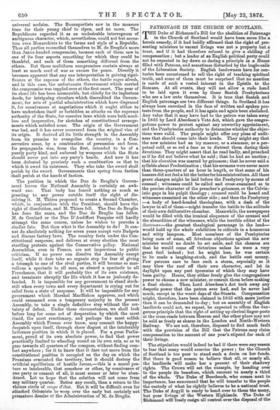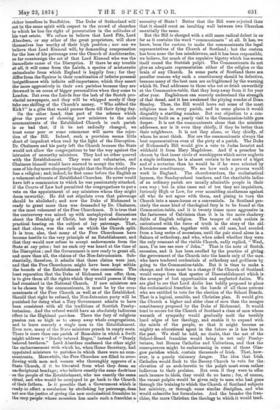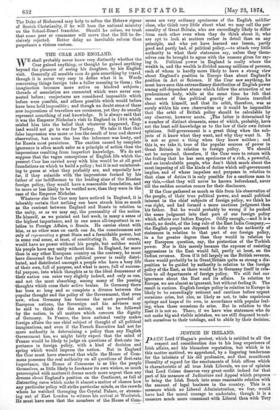PATRONAGE IN THE CHURCH OF SCOTLAND.
ri-IHE Duke of Richmond's Bill for the abolition of Patronage in the Church of Scotland would have been more like a heroic remedy, if it had boldly affirmed that the right of pre- senting ministers to vacant livings was not a property but a trust, and if it had therefore refused to give a shilling of compensation ; but a leader of an English political party could not be expected to lay down so daring a principle in a House filled with Patrons and sometimes disturbed by the bugle-calls of the Liberation Patrons, English landowners have for cen- turies been accustomed to sell the right of teaching spiritual truth, and some of them must be surprised that no mention is made of such a vested interest in the Epistle to the Romans. At all events, they will not allow a rude hand to be laid upon it even by those Scotch Presbyterians who are a law unto themselves. It is true that Scotch and English patronage are two different things. In Scotland it has always been exercised in the face of written and spoken pro- tests from the people, and it has again and again been abolished. Any value that it may have had to the patron was taken away in 1843 by Lord Aberdeen's Veto Act, which gave the congre- gations power to protest against any unworthy appointment, and the Presbyteries authority to determine whether the objec- tions were valid. The people might offer any pleas of unfit- ness that should come into their heads. They might say that the new minister had an icy manner, or a stammer, or a per- petual cold, or so red a face as to distract them during their devotions. They might assert that he read badly, and preached as if he did not believe what he said ; that he had no unction ; that his elocution was marred by grimaces ; that he never said a syllable about Predestination ; that his sermons were never more than three-quarters of an hour in length, or that some of his hearers did not feel a bit the better for his ministrations. All these grave charges might be laid before the Presbytery by means of counsel ; witnesses could be called and cross-examined as to the precise character of the preacher's grimaces, or the Calvin- istic gaps in his pulpit theology ; counsel could be heard and witnesses examined on the other side ; and then the Presbytery —a body of hard-headed theologians, with a dash of the lawyer in all of them—might transfer the battle to the solitude of their own deliberative chamber. Meanwhile, the newspapers would be filled with the ironical eloquence of the counsel and the absurdities of the witnesses, while the terrible editor of the Scotsman—the greatest theological personage in the land— would hold up the whole exhibition to ridicule in a humorous and witty lampoon. Most members of the Presbyteries being men of sense, all frivolous objections against the new minister would no doubt be set aside, and the chances are that he would come off victorious unless he were a very great fool indeed ; but he might lose, he was certain to be made a laughing-stock, and the battle cost money. Few patrons care to face such a storm, especially as it may blow the roof off their own character, and let in daylight upon any past tyrannies of which they may have been guilty. Hence, they either freely give the congregations power to choose a new minister, or consult them before making a final choice. Thus, Lord Aberdeen's Act took away any despotic power that the patron ever bad, and he never had much, except in the worst days of the Stuarts. Compensation might, therefore, have been claimed in 1843 with more justice than it can be demanded to-day ; but an assembly of English landlords could not, we repeat, be expected to affirm the dan- gerous principle that the right of setting up clerical finger-posts at the cross-roads between Heaven and the other place may not be sold as freely as shares in the London and North-Western Railway. We are not, therefore, disposed to find much fault with the provision of the Bill that the Patrons may claim compensation to the amount of one year's stipend for each of their livings.
The stipulation would indeed be bad if there were any reason to fear that many would exercise the power ; for the Church of Scotland is too poor to stand such a drain on her funds. But there is good reason to believe that all, or nearly all, the landlords will make her a present of their shadowy rights. The Crown will set the example, by handing over to the people its benefices, which amount to nearly a third of the whole. The Duke of Bnecleuch, who comes next in importance, has announced that be will transfer to the people the custody of what he rightly believes to be a national trust. The Duke of Argyll is ready to hand over to them the many, but poor livings of the Western Highlands. The Duke of Richmond will freely resign all control over the disposal of the richer benefices in Banffshire. The Duke of Sutherland will act in the same spirit with respect to the crowd of churches to which he has the right of presentation in the solitudes of his vast estate. We refuse to believe that Lord Fife, Lord Aberdeen, or any other of the great proprietors, will show themselves less worthy of their high position ; nor can we believe that Lord Kinnoul will, by demanding compensation for the loss of his patronage over the Church of Anchterarder, so far countersign the act of that Lord Kinnoul who was the immediate cause of the Disruption. If there be any trouble at all, it will come from the Lairds, a species of aristocratic animalcula3 from which England is happily free ; for they differ from the Squires in their combination of infinite personal insignificance with infinite self-importance, which they assert the more aggressively in their own parishes because they are drowned in an ocean of bigger personalities when they come to London. But even the Lairds fear the lash of the Scotch pro- vincial newspapers, and they will be whipped sorely if they take one shilling of the Church's money. "Who robbed the Kirk ?" is a gibe that would pursue them till their dying day. On the other hand, that part of the scheme which gives the power of choosing new ministers to the male communicants of the Established Church in each parish is so bad that, if it be not radically changed, we trust some peer or some commoner will move the rejec-
tion of the Bill. Indeed, such a provision seems little short of impudent when read by the light of the Disruption. Dr. Chalmers and his party left the Church because the State would not allow the congregations to bar the way against the intrusion of unworthy ministers. They had no other quarrel with the Establishment. They were not voluntaries, and Chalmers himself would have scorned to accept the title. No man of his day more eloquently taught that the State should pro- fess a religion ; and, indeed, he first came before the English as a vehement advocate of Established Churches. He never would have left a communion to which he was passionately attached, if the Courts of Law had permitted the congregations to put a veto on the appointment of any ministers whom they might deem unworthy. He did not stipulate even that patronage should be abolished ; and now the Duke of Richmond is ready to grant more than was demanded by Dr. Chalmers, or the most vehement of the Free Churchmen. It is true that the controversy was mixed up with metaphysical discussions about the Headship of Christ, but they had absolutely no practical bearing on the subject of lay patronage. That, and that alone, was the rock on which the Church split. It is true, also, that many of the Free Churchmen have become hostile to the very principle of an Establishment, and that they would now refuse to accept endowments from the State at any price ; but no such cry was heard at the time of the Disruption ; and the Government is now ready to grant all, and more than all, the claims, of the Non-Intrusionists. Sub- stantially, therefore, it admits that those claims were just, and that the Free Churchmen might have been kept within the bounds of the Establishment by wise concessions. The least reparation that the Duke of Richmond can offer, then, is to give them all the rights which they would possess if they had remained in the National Church. If new ministers are to be chosen by the communicants, it must be by the com- municants of the Free Church as well as of the Established. Should that right be refused, the Non-Intrusion party will be punished for doing what a Tory Government admits to have been consistent with all the traditions of Scottish Presby- terianism. And the refusal would have an absolutely ludicrous effect in the Highland parishes. There the fury of religions passion ran so high as to sweep away whole congregations, and to leave scarcely a single man to the Establishment. Even now, many of the State ministers preach to empty seats. There is more than one parish of Ross-shire in which a Swift might address a "Dearly beloved Roger," instead of "Dearly beloved brethren." Lord Aberdare confessed the other night the embarrassment with which he, when Home Secretary, had appointed ministers to parishes in which there were no com- municants. Meanwhile, the Free Churches are filled to over- flowing with men and women who thoroughly approve of a State Church, if it be liberated from what they deem an tut-Scriptural bondage; who believe exactly the same doctrines as the people of the Establishment, who use exactly the same ritual, and who would be overjoyed to go back to the Church of their fathers. Is it possible that a Government which is ready to effect a revolution by abolishing lay patronage does not see the justice of giving the new ecclesiastical franchise to the very people whose secession has made such a franchise a.
necessity of State Better that the Bill were rejected than
that it should erect an insulting wall between two Churches, essentially the same.
But the Bill is charged with a still more radical defect in so far as it contains the word " communicants " at all. It has, we know, been the custom to make the communicants the legal representatives of the Church of Scotland ; but the custom has been none the less mischievous, and it has been responsible, we believe, for much of the repulsive bigotry which has woven itself round the Scottish pulpit. The Communicants do not give an adequate representation either of the religion or the brain of any Church. In some parts of Scotland there are peculiar reasons why such a constituency should be defective, because many of the best men are so frightened by the warning which St. Paul addresses to those who eat or drink unworthily at the Communion-table, that they keep away from it for year after year. Englishmen can scarcely understand the strength of that dread, and it has awakened the pitying wonder of Dean Stanley. Thus, the Bill would leave out some of the most religious men in every parish, and in some places it would disqualify a startling number. But our objection to a con- stituency built on a yearly visit to the Communion-table goes deeper. It is not the communicants alone that the minister addresses, nor is it even they chiefly, if they be better than their neighbours. It is not they alone, or they chiefly, of whom he must think. Nor are the communicants always the best representatives even of the piety of a parish. The Duke of Richmond's Bill would give a vote to Judas Iscariot and withhold it from Mary Magdalene. And if a preacher be chosen by that inner circle of worshippers which never neglects a single ordinance, he is almost certain to be more of a bigot and of a sectarian than he would be if he were selected by a broader constituency. We see how such a process would work in England. The churchwardens, the ecclesiastical laymen, the Sunday-school teachers, and the charitable ladies of an ordinary parish are usually admirable people in their own way ; but in nine cases out of ten they are inquisitors, furiously High or Low, for ever mumbling anathemas against all who do not agree with them, and pining to turn the Church into a mass-house or a conventicle. In Scotland pre- cisely the same kind of theological fury is to be found at the Communion-table, and it is twenty times more aggressive in the fastnesses of Calvinism than it is in the more shadowy, fields of English religion. The temper of such zealots is caricatured with the force of truth in the story of the old Scotchwoman who, together with an old man, had seceded from a long series of secessions, until the pair stood alone in a Sahara of orthodoxy, and who, when asked whether they were the only remnant of the visible Church, sadly replied, "Wed, man, I'm nae sae sure o' John." That is the note of Scotch. secession, and it has been swelled by the practice of giving the government of the Church into the hands only of the men who have tendered credentials of orthodoxy and godliness by going to the Communion-table. But it is time to make a change, and there must be a change if the Church of Scotland would escape from that spectre of Disestablishment which is the avenger of lost opportunities and neglected duties. We are glad to see that Lord Airlie has boldly proposed to place the ecclesiastical franchise in the hands of all those persons who are entitled to vote for the election of the School Boards. That is a logical, sensible, and Christian plan. It would give the Church a higher and abler class of men than the meagre constituency proposed by the Duke of Richmond. It would tend to secure for the Church of Scotland a class of men whose warmth of sympathy would gradually melt the terribly hard edges of her theology, and enable it to expand with the minds of the people, so that it might become as mighty an educational agent in the future as it has been in the past. We shall be told, no doubt, that the net of the School-Board franchise would bring in not only Presby- terians, but Roman Catholics and Unitarians, and that the consequences might be embarrassing in. some of those Glae- gow parishes which contain thousands of Irish. That, how- ever, is a purely visionary danger. The idea that Irish Catholics would flock to the Barony Church to vote for the elevation of an arch-heretic to the pulpit must seem rather ludicrous to their prelates. But even if they were to offer such incense to idols, they could do no harm; for, of course the vacant pulpits would be given only to men who had gone through the training to which the Church of Scotland subjects her ministry, or through some similar discipline, and who would subscribe her formularies. And the broader the fran- chise, the more Christian the theology to which it would tend. The Duke of Richmond may help to soften the Hebrew rigour of Scotch Christianity, if he will base the national ministry on the School-Board franchise. Should he refuse, we trust that some peer or commoner will move that the Bill be de- cisively rejected. Better delay an inevitable reform than perpetuate a vicious custom.




































 Previous page
Previous page